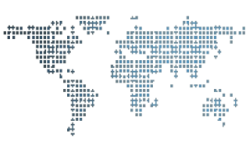Several discussions focused on Beyond Borders Investment Strategies, LLC (BBIS) and its twin goals of helping crisis-stricken countries recover from crises and earning attractive investment returns for our clients. I explained why we do this by investing in single-country equity Exchange Traded Funds (ETFs) representing these countries – where stock markets trade at low valuations – and exerting upward pressure on the stock prices of all public companies. Almost always, stock prices drop precipitously before and during major economic, business, financial, political, human health, environmental, or other crises.
By pushing stock prices up – or even slowing their declines initially – we reduce the pressure on companies’ CEOs to close corporate facilities and, most importantly, lay off employees. Layoffs in a company often cause layoffs in the company’s suppliers and buyers. Layoffs in just a few companies – and their buyers and suppliers – may lead to a vicious rise in unemployment that may destroy people’s well-being, health, dignity, and, often, lives in the entire country.
I explained BBIS’ goals and how they are implemented not in a vacuum but in comparison with the foreign-aid-based approach to helping countries recover from poverty and crises. This approach is dominant but wildly inefficient. Under this dominant approach, the governments of Western donor countries or multilateral development organizations such as the International Monetary Fund (IMF) or the World Bank give grants – ‘free’ money – or extend low-interest loans to the governments of poor and crisis-stricken countries.
In the report “Foreign Aid Theft Calls for an Investment Alternative to Help Crisis-Hit Nations,” I demonstrated numbers showing that the foreign-aid-based approach has not worked well for many decades. After more than five trillion dollars were spent as foreign aid to poor and crisis-stricken countries during 60 years from 1960 to 2019, less than a quarter of the nations managed to leave poverty behind and get off their dependence on foreign aid. [1] Not too impressive! More than three-fourths remained hooked to foreign aid as drug addicts to their drugs.
I listed all seven reasons why the foreign-aid-based approach has not reached the desired results in reducing poverty, fighting crises, and helping countries get (back) on the path of sustainable economic development. However, I focused on the same reason I discussed most with my classmates at MIT Sloan: foreign aid is often stolen. I explained why theft happened time and again and quantified the phenomenon with the numbers provided in an explosive World Bank report, which the bank was accused of trying to suppress. [2] I also shared striking numbers to quantify the theft of humanitarian aid in Russia during the first winter after the collapse of the Soviet Union and the stealing of materials on a significant World-Bank-financed road construction project in Indonesia.
I explained in the report why, at BBIS, we rely on investing in corporations in large part because it is much more difficult to steal from them than from governments. This principle holds both for physical assets and cash onsite as well as investments in their stocks on stock exchanges.
To read the full report, please Click Here
If helping countries recover from crises and stopping the suffering of their people – while earning investment returns – is as vital to you as it is for BBIS, its clients, and friends, please let me know. We may partner on this meaningful journey! Please let me know if you have any questions about BBIS or the firm’s investment strategies, want to be on our publication distribution list, or would like to invest with BBIS.
Thank you!
Best regards
Vitaly
Vitaly Veksler, CFA
CEO & Portfolio Manager
Beyond Borders Investment Strategies, LLC
[email protected]
P.S. The current report is partially based on a much more comprehensive 50-page-long white paper titled “Ending Devastating Crises While Earning Investment Returns,” which I authored in May 2023. If you are interested in the topic, please feel free to read that paper. For example, if you want to learn more about all seven reasons that make the foreign-aid-based approach inefficient, you may find them described and analyzed in that paper.
To read the white paper, please Click Here
[1] World Bank, “Net Official Aid Received (Constant 2020 US Dollars).” Downloaded on February 21, 2023.
[2] Kelsey Piper, Vox, “Some Development Aid Gets Misdirected. Did the World Bank Try to Suppress a Paper Saying So?” February 21, 2020.

 RSS Feed
RSS Feed